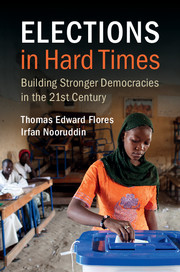Book contents
- Frontmatter
- Dedication
- Epigraph
- Contents
- List of figures
- List of tables
- Preface
- Part I From Elections to Democracy: Theory and Evidence
- Part II Challenges Facing Elections in Developing Countries
- Part III Democracy Promotion for the Twenty-first Century
- 8 Democracy Promotion for the Twenty-first Century
- 9 Conclusions
- Appendix A Data Appendix: Sample, Variables, Sources
- Appendix B Main Statistical Results
- Notes
- Bibliography
- Index
9 - Conclusions
from Part III - Democracy Promotion for the Twenty-first Century
Published online by Cambridge University Press: 05 September 2016
- Frontmatter
- Dedication
- Epigraph
- Contents
- List of figures
- List of tables
- Preface
- Part I From Elections to Democracy: Theory and Evidence
- Part II Challenges Facing Elections in Developing Countries
- Part III Democracy Promotion for the Twenty-first Century
- 8 Democracy Promotion for the Twenty-first Century
- 9 Conclusions
- Appendix A Data Appendix: Sample, Variables, Sources
- Appendix B Main Statistical Results
- Notes
- Bibliography
- Index
Summary
The political shockwaves of the late 1980s – the collapse of Communism, breakup of the Soviet Union, and end of the Cold War among them – yielded an electoral boom that swept the world in a matter of only ten years. The raw numbers by themselves are striking: the proportion of countries in the developing world holding competitive elections for executive office more than doubled between 1988 and 1998. The countries of the developing world held more elections in the twenty-two years between 1988 and 2010 than in the forty-one years between 1946 and 1987. Not only did elections become more numerous, they also grew in integrity. The elections of the electoral boom have featured increased competition among more numerous political parties freer from harassment by incumbents. By our reckoning, the proportion of elections dubbed at least minimally competitive increased from about 60 percent before 1988 to 87 percent afterwards.
Yet the raw numbers of the electoral boom, however impressive they may be, cannot do justice to the electoral boom's impact on politics around the world. The manner in which political leaders are chosen transformed rapidly and fundamentally in Latin America, Eatern Europe, Sub-Saharan Africa, South Asia, and East Asia. No longer did military juntas, ruling parties, dueling armed factions, or ruling families dominate the choice of chief executives. Politicians instead faced electorates in mass-suffrage elections, sometimes for the first time in a generation. South Africans voted in the first post-apartheid election, sweeping Nelson Mandela to power with over 85 percent turnout. Ninety-eight percent of Chileans turned out to vote to end General Augusto Pinochet's rule. The same dictator who had continually used repressive means to remain in power simply accepted the verdict of the Chilean people and left power, leaving behind an amended democratic constitution. These and other elections around the world symbolized the promise of democracy, peaceful political change, and a new dawn of politics.
This optimism ironically was often felt most strongly in the West, where politicians and intellectuals interpreted the electoral boom as the triumph not of local elites over repression, but of a Western ideal of liberal democracy. Francis Fukuyama offered the most optimistic and forceful formulation of this premise.
- Type
- Chapter
- Information
- Elections in Hard TimesBuilding Stronger Democracies in the 21st Century, pp. 194 - 205Publisher: Cambridge University PressPrint publication year: 2016



